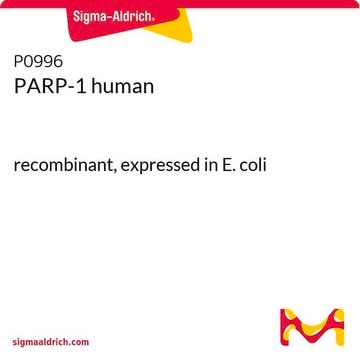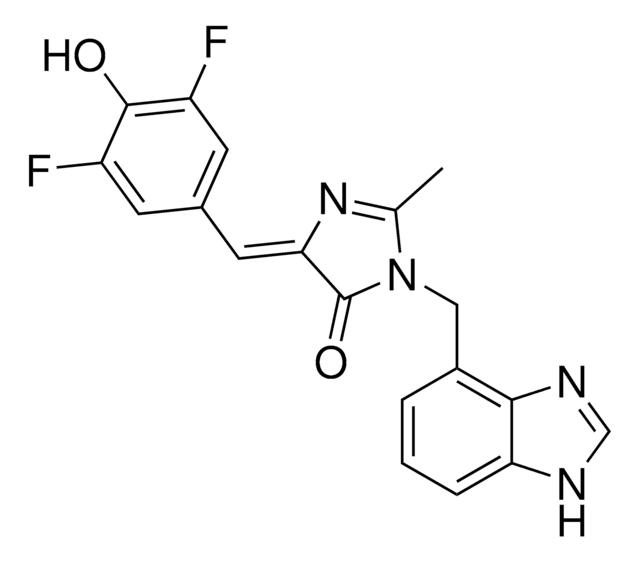推荐产品
生物源
human
重組細胞
expressed in baculovirus infected insect cells
化驗
≥80% (SDS-PAGE)
形狀
aqueous solution
分子量
140 kDa
包裝
pkg of 10 and 20 μg
製造商/商標名
Sigma-Aldrich
儲存條件
avoid repeated freeze/thaw cycles
濃度
>0.02 mg/mL
技術
inhibition assay: suitable
NCBI登錄號
UniProt登錄號
應用
life science and biopharma
運輸包裝
dry ice
儲存溫度
−70°C
基因資訊
human ... PARP1(142)
一般說明
Research area: Cell Signaling
Human PARP1 (GenBank Accession No. NM_001618), full length with N-terminal GST tag, MW = 140 kDa, expressed in a Baculovirus infected Sf9 cell expression system. Poly [ADP-ribose] polymerase 1 (PARP1) belongs to the DNA-dependent nuclear enzyme superfamily. Its structure includes an N-terminal with three zinc finger DNA-binding domains, an auto-modification domain with BRCT motif and a WGR domain having conserved tryptophan, glycine, and arginine residues, and a C-terminal catalytic domain with PARP signature sequence.
Human PARP1 (GenBank Accession No. NM_001618), full length with N-terminal GST tag, MW = 140 kDa, expressed in a Baculovirus infected Sf9 cell expression system. Poly [ADP-ribose] polymerase 1 (PARP1) belongs to the DNA-dependent nuclear enzyme superfamily. Its structure includes an N-terminal with three zinc finger DNA-binding domains, an auto-modification domain with BRCT motif and a WGR domain having conserved tryptophan, glycine, and arginine residues, and a C-terminal catalytic domain with PARP signature sequence.
應用
PARP1 Active human has been used in GST-PARP1 pulldown, to study the alterations in protein-protein interactions of sex determining region Y-box 2 (SOX2) upon O-GlcNAcylation. It has also been used in in vitro PARylation assay to investigate the effect of NR1D1 on DNA repair after damage induced by doxorubicin in breast cancer cells. It is useful for the study of enzyme kinetics, screening inhibitors, and selectivity profiling.
生化/生理作用
PARPs comprise a set of enzymes that govern cellular processes such as DNA damage response, cell metabolism, chromatin remodeling, and transcriptional regulation. PARP1 detects and mends DNA breaks via base excision repair when DNA damage occurs. In the absence of PARP1 activity, damaged DNA accumulates, leading to impaired DNA replication.
單位定義
One unit of PARP incorporates 100 pmoles of poly(ADP) in 1 minute (room temperature) from NAD into acid-insoluble form.
外觀
Formulated in 25 mM Tris-HCl, pH 8.0, 100 mM NaCl, 0.05% Tween-20, 50% glycerol and 3 mM DTT.
準備報告
Thaw on ice. Upon first thaw, briefly spin tube containing enzyme to recover full content of the tube. Aliquot enzyme into single use aliquots. Store remaining undiluted enzyme in aliquots at -70°C. Note: Enzyme is very sensitive to freeze/thaw cycles.
儲存類別代碼
10 - Combustible liquids
水污染物質分類(WGK)
WGK 1
閃點(°F)
Not applicable
閃點(°C)
Not applicable
Fengxiao Zhang et al.
International journal of biological sciences, 16(15), 2868-2882 (2020-10-17)
Liver X receptor α (LXRα) controls a set of key genes involved in cholesterol metabolism. However, the molecular mechanism of this regulation remains unknown. The regulatory role of poly(ADP-ribose) polymerase 1 (PARP1) in cholesterol metabolism in the liver was examined.
Caifeng Liu et al.
Journal of integrative plant biology, 59(7), 459-474 (2017-03-07)
Root organogenesis involves cell division, differentiation and expansion. The molecular mechanisms regulating root development are not fully understood. In this study, we identified poly(adenosine diphosphate (ADP)-ribose) polymerases (PARPs) as new players in root development. PARP catalyzes poly(ADP-ribosyl)ation of proteins by
SOX2 O-GlcNAcylation alters its protein-protein interactions and genomic occupancy to modulate gene expression in pluripotent cells
Myers SA, et al.
eLife, 5, e10647-e10647 (2016)
Kostantin Kiianitsa et al.
DNA repair, 96, 102977-102977 (2020-10-12)
The nucleoside analog 5-aza-2'-deoxycytidine (5-aza-dC) is used to treat some hematopoietic malignancies. The mechanism of cell killing depends upon DNMT1, but is otherwise not clearly defined. Here we show that PARP1 forms covalent DNA adducts in human lymphoblast or fibroblasts
Anneli Andersson et al.
Nucleic acids research, 44(16), 7630-7645 (2016-05-21)
Harmful oxidation of proteins, lipids and nucleic acids is observed when reactive oxygen species (ROS) are produced excessively and/or the antioxidant capacity is reduced, causing 'oxidative stress'. Nuclear poly-ADP-ribose (PAR) formation is thought to be induced in response to oxidative
我们的科学家团队拥有各种研究领域经验,包括生命科学、材料科学、化学合成、色谱、分析及许多其他领域.
联系技术服务部门






